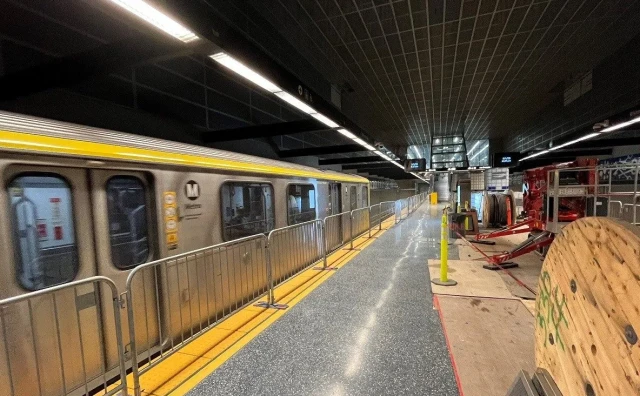With our free press under threat and federal funding for public media gone, your support matters more than ever. Help keep the LAist newsroom strong, become a monthly member or increase your support today during our fall member drive.
Effects Of 2010 Earthquake Still Mar Haiti
SCOTT SIMON, HOST:
Three years ago today, a massive earthquake destroyed much of Port-au-Prince, the capital of Haiti. About 200,000 people were killed. More than a million were left homeless. Governments and aid agencies from around the world pledged billions of dollars to help Haiti recover - and rebuild - from the quake. Secretary of State Hillary Clinton was just one of many leaders who vowed that the international community would stand by Haiti for the long process of reconstruction.
(SOUNDBITE OF ARCHIVED RECORDING)
SECRETARY HILLARY CLINTON: We will also be conveying - very directly and personally - to the Haitian people our long-term, unwavering support, solidarity and sympathies; to reinforce President Obama's message yesterday, that they are not facing this crisis alone.
SIMON: But three years later, many of the grand plans to build back better in Haiti have, apparently, fizzled. NPR's Jason Beaubien covered the quake in 2010. He's been back numerous times. He joins us from Port-au-Prince. Jason, thanks for being with us.
JASON BEAUBIEN, BYLINE: No, it's good to be with you.
SIMON: And help us understand what has happened over the last three years.
BEAUBIEN: What has happened is that basically, people have been kept alive. People moved into camps. Humanitarian aid agencies came in; they provided water, they provided tarps. There have been a lot of plans for new housing construction, for new apartment buildings - for all kinds of things, but most of those have not happened.
Only about 5,000 units of permanent, new housing have been built. There are still hundreds of thousands of people living in tents. Many of the temporary shelters that were built by aid agencies - made out of just plywood, with a roof - those, basically, have become permanent. So the lot of the grand plans just have not worked out.
SIMON: For all the effort, there must be some major accomplishments.
BEAUBIEN: You know, one of the big accomplishments is that most of the rubble has gotten removed; hence, you don't see huge piles of rubble around Port-au-Prince anymore. It's something that the humanitarian agencies talk about; just - also the fact that people were kept alive, is something that they tout as a major accomplishment.
But just last night, President Martelly was complaining that for the billions of dollars that were pledged, that came in here, that were spent by aid agencies, he's not seeing results. And he says he's not satisfied with the way this process has gone.
SIMON: Jason, how does Port-au-Prince look, three years afterwards?
BEAUBIEN: What's sort of interesting - having been here before the earthquake - is that in many ways, it looks very similar to before the quake. There are just people going about their daily lives; doing business out on the street, selling things along the roadways. The traffic is actually much worse now because a lot of people have moved further out, and so people are moving farther each day. So there's even more of a grind for the traffic, but it is bustling; still very poor. What strikes me the most, however, is that it looks very much like it did before the quake.
SIMON: NPR's Jason Beaubien, speaking with us from Port-au-Prince, Haiti. Thanks so much, Jason.
BEAUBIEN: You're welcome. Transcript provided by NPR, Copyright NPR.
At LAist, we believe in journalism without censorship and the right of a free press to speak truth to those in power. Our hard-hitting watchdog reporting on local government, climate, and the ongoing housing and homelessness crisis is trustworthy, independent and freely accessible to everyone thanks to the support of readers like you.
But the game has changed: Congress voted to eliminate funding for public media across the country. Here at LAist that means a loss of $1.7 million in our budget every year. We want to assure you that despite growing threats to free press and free speech, LAist will remain a voice you know and trust. Speaking frankly, the amount of reader support we receive will help determine how strong of a newsroom we are going forward to cover the important news in our community.
We’re asking you to stand up for independent reporting that will not be silenced. With more individuals like you supporting this public service, we can continue to provide essential coverage for Southern Californians that you can’t find anywhere else. Become a monthly member today to help sustain this mission.
Thank you for your generous support and belief in the value of independent news.

-
Restaurants share resources in the food hall in West Adams as Los Angeles reckons with increasing restaurant closures.
-
It will be the second national day of protest against President Donald Trump.
-
The university says the compact, as the Trump administration called it, could undermine free inquiry and academic excellence.
-
This is the one time you can do this legally!
-
Metro officials said it will be able to announce an opening date “soon.”
-
While working for the county, the DA’s office alleges that 13 employees fraudulently filed for unemployment, claiming to earn less than $600 a week.







